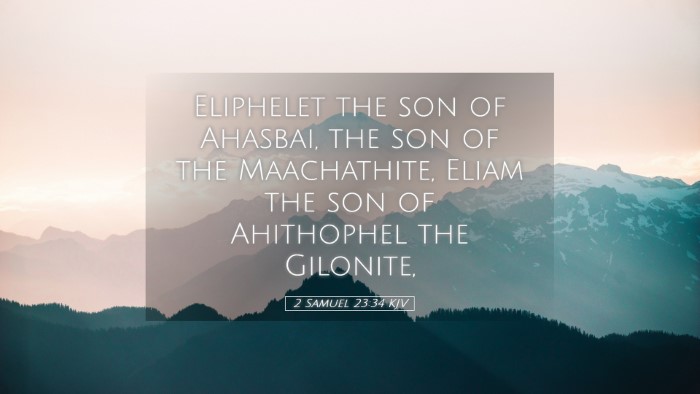Commentary on 2 Samuel 23:34
Verse: 2 Samuel 23:34 - "Elimelech the son of Abiathar, the son of Ahimelech, the son of Ahitub."
Introduction
This verse is part of the concluding chapter of 2 Samuel, which outlines the accomplishments of David's mighty warriors. Elimelech, mentioned here as a descendant of Abiathar, signifies the importance of priestly lineage and legacy in Israel's history.
Context and Significance
The genealogy presented here is significant as it connects the mighty men of David with the priestly line, showcasing God’s presence among His people in times of conflict. The mention of Elimelech serves as a reminder of the intertwined nature of David's leadership and the priesthood.
Insights from Matthew Henry
Henry notes that genealogy in Scripture often serves to underscore the faithfulness of God’s promises across generations. The lineage from Ahimelech illustrates the continuation of divine service in the face of adversity. Abiathar, being the sole survivor of the massacre at Nob, emphasizes God’s providence in preserving a line of faithful men devoted to His service.
- Faithfulness in Adversity: Elimelech's heritage is indicative of the steadfastness of God’s people during tumultuous times.
- God’s Providence: The mention of these names is not merely historical but is intended to highlight that God’s plans endure despite human failure.
Insights from Albert Barnes
Barnes emphasizes the historical significance of Elimelech's name in the context of the priesthood. He notes that Elimelech, being a descendant of Abiathar, symbolizes the connection between David's kingship and the priestly order, representing both political strength and spiritual authority.
- Priestly Role: The priesthood plays a crucial role in guiding the nation, and Elimelech's association provides a reminder of the importance of divine guidance in leadership.
- Covenantal Dependence: The lineage reflects Israel's dependence on the covenant and God’s everlasting mercy and sovereignty.
Insights from Adam Clarke
Clarke provides a detailed exploration of the names within the context of their roles. He examines the implications of the presence of these priests during David's reign and the significance of their devotion amidst political strife.
- Spiritual Legacy: Clarke suggests that the lineage indicates a strong spiritual heritage that should encourage believers to understand their own spiritual lineages.
- Leadership and Accountability: The leadership role of these mighty men, including Elimelech, underscores a model of accountability to both God and the people.
Theological Reflections
In examining the role of Elimelech within the broader narrative, several theological themes emerge:
- Judgment and Mercy: The mention of the priestly line serves as a reminder of God’s continued mercy amidst judgment. It illustrates how God's plan often weaves through human history, maintaining a remnant.
- Intercession: The priests in Israel were mediators between God and the people, a theme that culminates in the ultimate high priesthood of Christ.
- Legacy of Faith: Modern readers are encouraged to consider their own spiritual heritage and the importance of passing on faithfulness through generations.
Conclusion
2 Samuel 23:34 is not just a genealogical record but serves as a powerful reminder of the faithfulness of God across generations. The memories of men like Elimelech and his lineage remind us of the importance of both leadership and the priestly duties in worship and fidelity to God. As believers reflect on these attributes, they are encouraged to strive for a similar dedication to their covenant with God, ensuring that faithfulness is passed down as a legacy to future generations.


